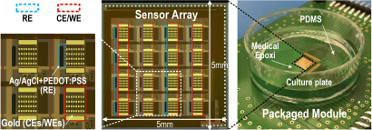Electrically verifying a CMOS Multi-Modal Electrochemical, Impedance, and Optical Cellular Sensing Array for Massively Paralleled Exoelectrogen Screening

Project Description
Electrically test a new CMOS sensor array for characterizing the genetic variants of exoelectrogens, which are microorganisms that can transfer electrons between intracellular components and extracellular entities. Exoelectrogens have a wide range of applications in industrial and defense areas due to their unique current-generating abilities. However, their low electron transfer rates and inability to derive energy from complex energy sources limit their utility. The project proposes to use the CMOS multi-sensor array to provide high throughput multi-parametric physiological information on exoelectrogens, which requires multi-modal sensing due to the complexity and long time-scales of electrochemical charge transfer. The proposed chip is composed of standard high-precision three-electrode potentiostats and high sensitivity current detection circuits, and photodiodes, along with impedance sensing blocks that measure cell adhesion to the chip surface and track biofilm proliferation. The chip can function autonomously and can be integrated with droplet-based microfluidics to interrogate multiple samples simultaneously, reducing the required sample volume to as low as 50nL. The project's goal is to electrically verify this chip in the effort to improve the throughput and efficacy of the design build test learn cycle used to develop cell strains containing desired properties.
Requirements
- Analog Integrated Circuits
- PCB Design
- MATLAB/Simulink experience
- Labview experience
- Chip packaging experience (wirebond)
Project components
- 30% PCB Design
- 30% Labview code for chip and equipment programming
- 40% Electrical Testing
Background material
- https://ieeexplore.ieee.org/document/9385934
Contact
- Adam Wang :adwang [at] iis.ee.ethz.ch
- Prof. Dr. Hua Wang :hua.wang [at] iis.ee.ethz.ch